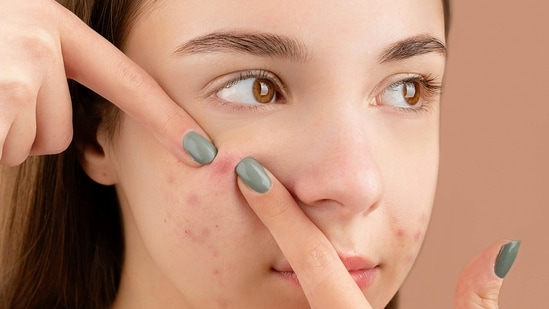Our Terms & Conditions | Our Privacy Policy
Delhi AQI alert: Can pollution affect skin? Doctor warns of psoriasis, acne, atopic dermatitis | Health
Delhi’s air pollution is hitting alarming highs each day, with most stations recording severe category. With the rise in the AQI levels, it is essential to understand the harrowing effects that it can have on the health of the people breathing in the air. In an interview with HT lifestyle, Dr. Gunjan Verma, Consultant – Dermatology, Manipal Hospital, Dwarka, New Delhi, pointed out its effect on skin.
Air pollution can trigger conditions such as acne, psoriasis, atopic dermatitis.(Pexels)
ALSO READ: Doctor reveals air pollution’s worst effect on health, warns: ‘If your exposure is more than 4 hours…’
Air pollution’s effect on skin:
“The pollutants can enter the skin through direct accumulation on the surface, absorption via hair follicles, inhalation, ingestion, and circulation of pollutants in plasma, which then diffuse into deeper dermal tissues. These pollutants penetrate the skin via nanoparticles and generate quinones, which are redox-cycling chemicals that produce reactive oxygen species (ROS). Air pollution can also cause oxidative stress,” said Dr Gunjan Verma. It can trigger conditions such as acne, psoriasis, atopic dermatitis. There’s also a tendency of issues like lentigo, melasma, and photo aging to increase.
ALSO READ: Toxic air alert: How polluted air can harm your health, from heart to brain
 Air pollution’s effect on skin.(Unsplash)
Air pollution’s effect on skin.(Unsplash)
Skincare tips to stay safe:
A healthy diet: To combat the effects of pollution, it is recommended to consume foods high in antioxidants, such as fruits, vegetables, whole grains, and legumes. Antioxidants help neutralize free radicals produced as a result of toxic air pollutants entering the body. Thus, a diet rich in antioxidants may help protect from the damage caused by air pollution.
ALSO READ: How to protect hair from air pollution if your city has poor AQI
Cleanse the skin regularly: Cleansing the skin is a critical part of an anti-pollution skin regimen because airborne pollutants can bind to the skin and weaken the skin barrier, rendering it more susceptible to UV damage, dryness, wrinkles, and hyperpigmentation.
ALSO READ: Delhi’s toxic air is back: 8 tips to protect your lung health, children and family amid ‘very poor’ AQI alert
Wear a mask: It is advisable to wear a mask and cover your mouth while going out and limit going out unless necessary. Regarding skin cancers, the pollutants that react most specifically with the skin are UV radiation, VOCs, heavy metals, and O3. UV radiation – a physical pollutant – is thought to be the primary factor responsible for most skin cancers in humans.
Disclaimer: This article is for informational purposes only and not a substitute for professional medical advice. Always seek the advice of your doctor with any questions about a medical condition.
Images are for reference only.Images and contents gathered automatic from google or 3rd party sources.All rights on the images and contents are with their legal original owners.



Comments are closed.